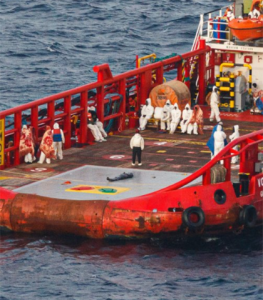Migrant pushbacks under fire
International condemnation has followed the handing over to Libyan authorities of 270 migrants and refugees who were rescued at sea by a Gibraltar-flagged ship.
The International Organisation for Migration (IOM) and UNHCR, the UN Refugee Agency have both said that no one should be returned to Libya after being rescued at sea.
 “Under international maritime law, rescued individuals should be disembarked at a place of safety,” the agencies said.
“Under international maritime law, rescued individuals should be disembarked at a place of safety,” the agencies said.
News of the incident comes as a new report says that increasingly in places around the world, migrants and asylum seekers are being blocked from reaching their destinations or are being forcibly removed from them.
The report by the UN Special Rapporteur on the Human Rights of Migrants Felipe González Morales says so-called ‘push-backs; are on the rise.
It says that by failing to provide individual assessments of migrants’ situations or taking other procedural safeguards “pushbacks result in human-rights violations incompatible with states’ obligations under international human-rights law, in particular, the prohibition of collective expulsion and refoulement.”
“There have been extensive reports of pushbacks, defined broadly as any effort to prevent migrants from reaching a territory or removing them without conducting an individual assessment,” the report says.
“Among them have been European initiatives on land, in the Mediterranean, and in the Aegean, as well as numerous incidents at the US-Mexico border, in the waters around Australia, between Algeria and Niger, and elsewhere,” it says.
Pushbacks are “widespread” and have been reported “along most migration routes from all regions of the world experiencing mixed movements of migrants,” Mr González reported.
“Many situations have been aggravated during the overall chill on global movement prompted by the COVID-19 pandemic,” he said.
Activists and aid groups say the new report is further evidence of the strain on the international humanitarian protection system.
As it marks its 70th anniversary next month, the Refugee Convention is looking less and less fit for purpose, they say.
Meanwhile the Global Compacts on Refugees and for Safe, Orderly, and Regular Migration, are still works in progress.
At the same time, IOM and UNHCR say that in the absence of predictable disembarkation mechanisms, maritime actors should not be obliged to return refugees and migrants to unsafe places.
“IOM and UNHCR call on States to coordinate so that merchant vessels rescuing people in distress are granted swift permission for disembarkation in a place of safety, to avoid lives being placed at risk,” the agencies said in a statement.
They said migrants and refugees disembarked in Libya often end up in appalling conditions where they may be exposed to abuse and extortion. Others go missing and are unaccounted for, raising fears that some may have been channelled into human trafficking networks.












